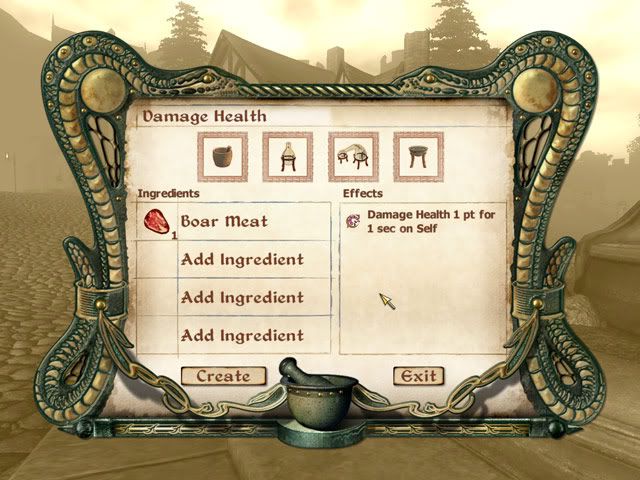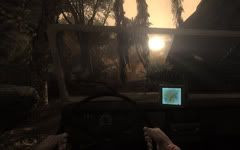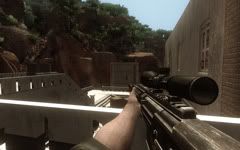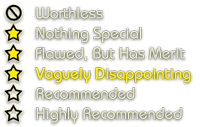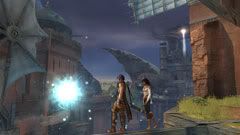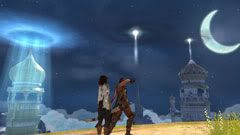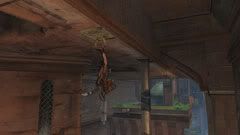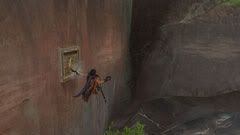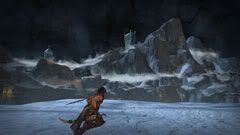Yeah, so my Photobucket account bandwidth has been exceeded by like a million. A million bandwidth. This is because I inadvertently linked two images on a high-traffic forum. (I guess they were fairly large images, too -- animated GIFs from a TV show.) So I guess now I either gotta upgrade to Pro or wait it out; the latter would take at least another 2 months, I'm pretty sure.
Has anyone ever upgraded to Pro anything? Seriously?
Thursday, November 19, 2009
Sunday, October 11, 2009
Nobel, No Peace
Two Obama posts in a row? Sorry about that.
I consider it an honor that the Nobel Committee has decided to select the United States president as the recipient of the Nobel Peace Prize this year. Whoever the president currently is, he represents my country, and so it's nice to see that some European dudes aren't mad at us anymore.
But at the same time, like everybody else, I'm wondering... Why? It seems like he's getting the prize for just... being Obama. For being essentially the most important guy in the world while simultaneously embracing a philosophy of peace. I'm flattered that the committee is so confident that he'll bring about a new golden age, but shouldn't we wait for at least one act of "proof" first? Just to make the award actually mean something? I know it's almost impossible to "prove" that a philosophy works in the real world, but I think it would help if we just had a few results that at least corroborated his strategies, so that people who agree and disagree with him can both say, "Well, maybe there's something there." But until then, it seems like they're just rewarding a philosophy.
Looking over the list of previous Nobel winners, I don't think I can honestly say Obama doesn't "deserve" the award. Maybe the award's just never been all it's cracked up to be. But this is an example everyone's paying attention to, so let's use it.
So one thing that occurs to me just, you know, out of the blue, is that Barack Obama is currently presiding over a war. (As in, not peace.) He may not have started it, he may not agree with it, but right now, part of his job description is to represent the US's role in it. My suggestion to the committee would be to see how that goes. See what happens when he ends the war. If Afghanistan does not, in fact, burst into flames upon the removal of our troops, then hey, give him a medal! It may or may not be entirely his fault if it goes smoothly, but it's still an accomplishment. It's not an easy thing for any president to do.
I'm not going to froth at the mouth here, but the whole thing just seems a little silly. If wanting peace is all it takes to get a Nobel Prize, they're gonna have a lot more to give out.
Does it matter, ultimately? Probably about as much as the Oscars. So, see you then.
I consider it an honor that the Nobel Committee has decided to select the United States president as the recipient of the Nobel Peace Prize this year. Whoever the president currently is, he represents my country, and so it's nice to see that some European dudes aren't mad at us anymore.
But at the same time, like everybody else, I'm wondering... Why? It seems like he's getting the prize for just... being Obama. For being essentially the most important guy in the world while simultaneously embracing a philosophy of peace. I'm flattered that the committee is so confident that he'll bring about a new golden age, but shouldn't we wait for at least one act of "proof" first? Just to make the award actually mean something? I know it's almost impossible to "prove" that a philosophy works in the real world, but I think it would help if we just had a few results that at least corroborated his strategies, so that people who agree and disagree with him can both say, "Well, maybe there's something there." But until then, it seems like they're just rewarding a philosophy.
Looking over the list of previous Nobel winners, I don't think I can honestly say Obama doesn't "deserve" the award. Maybe the award's just never been all it's cracked up to be. But this is an example everyone's paying attention to, so let's use it.
So one thing that occurs to me just, you know, out of the blue, is that Barack Obama is currently presiding over a war. (As in, not peace.) He may not have started it, he may not agree with it, but right now, part of his job description is to represent the US's role in it. My suggestion to the committee would be to see how that goes. See what happens when he ends the war. If Afghanistan does not, in fact, burst into flames upon the removal of our troops, then hey, give him a medal! It may or may not be entirely his fault if it goes smoothly, but it's still an accomplishment. It's not an easy thing for any president to do.
I'm not going to froth at the mouth here, but the whole thing just seems a little silly. If wanting peace is all it takes to get a Nobel Prize, they're gonna have a lot more to give out.
Does it matter, ultimately? Probably about as much as the Oscars. So, see you then.
Tuesday, September 08, 2009
NOT MY PRESIDENT!!!!!!!!!!!1
"They started it!"
As a kid, I was taught that this wasn't a good enough excuse. What are we teaching our kids now?
This week, President Obama made a speech about the importance of education to schools nationwide. Except for the ones that refused to participate.
Refused the president? First of all, wow. I'm glad I live in a country where schools can actually do that. But come on -- pick your battles. The election is over, and like it or not, Barack Obama IS your president. The office needs to be respected, to some extent. Isn't respect for authority something children should be learning? Isn't that the kind of thing Republicans love to whine about? It'd be one thing if the speech had serious political overtones to it, like if he were promoting his health care plan. But this is just the president, telling kids to stay in school. There is no harm in that, and deep down, everybody knows it.
(And even if, hypothetically, the speech had any political overtones, which is to be expected from a politician... you do realize he's not still campaigning, right? He won the election. He's kind of earned that right.)
I think I see what's going on here. Bush got trashed, and trashed hard. "Not My President" was a popular rallying cry among Democrats during his 8 years in office, and there were a lot of people who didn't show him presidential respect. (To put it mildly.) Now the tables have turned, and Republicans have a chance to say "But what if it was BUSH saying this? Wouldn't you be trashing him? Huh? Why should we respect the president now?"
Or, to put it more simply -- more honestly, actually -- "They started it!"
As a kid, I was taught that this wasn't a good enough excuse. What are we teaching our kids now?
This week, President Obama made a speech about the importance of education to schools nationwide. Except for the ones that refused to participate.
Refused the president? First of all, wow. I'm glad I live in a country where schools can actually do that. But come on -- pick your battles. The election is over, and like it or not, Barack Obama IS your president. The office needs to be respected, to some extent. Isn't respect for authority something children should be learning? Isn't that the kind of thing Republicans love to whine about? It'd be one thing if the speech had serious political overtones to it, like if he were promoting his health care plan. But this is just the president, telling kids to stay in school. There is no harm in that, and deep down, everybody knows it.
(And even if, hypothetically, the speech had any political overtones, which is to be expected from a politician... you do realize he's not still campaigning, right? He won the election. He's kind of earned that right.)
I think I see what's going on here. Bush got trashed, and trashed hard. "Not My President" was a popular rallying cry among Democrats during his 8 years in office, and there were a lot of people who didn't show him presidential respect. (To put it mildly.) Now the tables have turned, and Republicans have a chance to say "But what if it was BUSH saying this? Wouldn't you be trashing him? Huh? Why should we respect the president now?"
Or, to put it more simply -- more honestly, actually -- "They started it!"
Sunday, August 30, 2009
YouCool
So about a year ago, that Cowboy Bebop/Queens of the Stone Age music video I made was disabled due to a copyright claim. Well guess what? It came back!
Apparently this was not magic. The video now includes a hovering link/advertisement to legally purchase the song on Amazon. And guess what? I'm totally fine with that! I suspect many others would be too, were the option given to them. The way I see it, the whole point of making a fan music video for something is to portray the song in the best possible way. It's a way of promoting the music, really. So why wouldn't I want to provide people with a link to buy the song? It's a win-win situation.
Unless, of course, the video is horrible. And I guess that's one of the reasons intellectual property law exists; to say "Whoa, we have nothing to do with this. Take that down, it's embarrassing."
Hopefully this trend continues. I'm not overly optimistic that all unauthorized uses of music will be treated with such mercy, but in most cases I believe it's the best way to deal with it. Take what's unofficial and make it official.
I suppose it only makes sense to put the video here as well. So here it is. It's my first video editing project, from 2003. It's decent enough to display in public.
Apparently this was not magic. The video now includes a hovering link/advertisement to legally purchase the song on Amazon. And guess what? I'm totally fine with that! I suspect many others would be too, were the option given to them. The way I see it, the whole point of making a fan music video for something is to portray the song in the best possible way. It's a way of promoting the music, really. So why wouldn't I want to provide people with a link to buy the song? It's a win-win situation.
Unless, of course, the video is horrible. And I guess that's one of the reasons intellectual property law exists; to say "Whoa, we have nothing to do with this. Take that down, it's embarrassing."
Hopefully this trend continues. I'm not overly optimistic that all unauthorized uses of music will be treated with such mercy, but in most cases I believe it's the best way to deal with it. Take what's unofficial and make it official.
I suppose it only makes sense to put the video here as well. So here it is. It's my first video editing project, from 2003. It's decent enough to display in public.
Friday, July 17, 2009
Review Fighter IV
I know it's very nerdy to rage over video game reviews -- in most cases, reviews of games that you've never played but want to like and can't bear to see get anything less than a 10/10 -- but the gaming press does have its fair share of legitimate annoyances. Take, for example, the IGN review of the PC version of Street Fighter 4. Some have complained about the fact that the graphics scored lower than on the other platforms, and other such minutiae. I can accept that; even though the PC version's graphics are objectively better in every way, a different reviewer approaching the same game is going to rate its graphics differently.
What is a bit irksome, though, is the lack of any mention of some of the PC-exclusive features, most notably the inclusion of three graphical filters. Whether the reviewer loved these filters or simply found them not worthwhile, it's something that should be commented on in some way, since it was one of the PC version's only unique selling points.
The more baffling issue here is that the reviewer claims to have had severe difficulty finding anyone to play online with. I find this hard to believe, assuming he tested the game during (and not before) its release week, which he asserts he did. I can say from first-hand experience that since the very first day of release and to this day, over a week since, finding an opponent online has been remarkably easy. In fact, in my several hours of play I have only ever managed to complete one match of Arcade Mode, because I am constantly interrupted by fight requests, often before my fight against the computer even begins. The only thing easier than finding a match in this game is breathing. Hence my assertion that this reviewer must have tripped on either his network cable or acid.
What is a bit irksome, though, is the lack of any mention of some of the PC-exclusive features, most notably the inclusion of three graphical filters. Whether the reviewer loved these filters or simply found them not worthwhile, it's something that should be commented on in some way, since it was one of the PC version's only unique selling points.
The more baffling issue here is that the reviewer claims to have had severe difficulty finding anyone to play online with. I find this hard to believe, assuming he tested the game during (and not before) its release week, which he asserts he did. I can say from first-hand experience that since the very first day of release and to this day, over a week since, finding an opponent online has been remarkably easy. In fact, in my several hours of play I have only ever managed to complete one match of Arcade Mode, because I am constantly interrupted by fight requests, often before my fight against the computer even begins. The only thing easier than finding a match in this game is breathing. Hence my assertion that this reviewer must have tripped on either his network cable or acid.
Labels:
IGN,
PC,
review,
Street Fighter,
Street Fighter 4,
Street Fighter IV,
Windows
Wednesday, June 10, 2009
MUTE MATH - ARMISTICE
Gotta buy this, guys.
Listen to the first track via the link to their main site, and also watch the video for Spotlight.
Listen to the first track via the link to their main site, and also watch the video for Spotlight.
![]()
Monday, June 08, 2009
Uplifter: the 311-est album of 2009
There's probably something a little bit off about Uplifter, 311's first new album in 4 years, but the album doesn't really give you a chance to stop and figure out what it is. It's jam-packed with tight, fun, great-sounding tracks with just enough funky grooves to keep it from turning into white noise. You sense that perhaps 311 is losing their creative spark after 15 years or so, perhaps they're trying too hard, but at the very least, they're trying. This is a welcome change from Don't Tread On Me, which was so laid back, it was unclear whether they were trying very much at all. The production seems like it may be a bit overcompressed, but if you're playing it loud enough to notice, well, you probably won't notice. It's an unabashedly enjoyable listen.
Get the deluxe edition, because the two bonus tracks are just as refined as the rest of the album. iTunes has an exclusive track that can unfortunately only be accessed by buying the entire album there, hence missing out on the physical album. Amazon.com has an exclusive track as well, but fortunately it can be downloaded on its own. It's better than the iTunes exclusive... but perhaps I'm just biased.
Get the deluxe edition, because the two bonus tracks are just as refined as the rest of the album. iTunes has an exclusive track that can unfortunately only be accessed by buying the entire album there, hence missing out on the physical album. Amazon.com has an exclusive track as well, but fortunately it can be downloaded on its own. It's better than the iTunes exclusive... but perhaps I'm just biased.
Thursday, June 04, 2009
Exclusivity in Crysis
One of the first announcements of this announcement-packed week was the existence of Crysis 2. From a storyline perspective, this is no surprise: Crysis ended with the main character beginning to do something. What is surprising -- and, to some poor souls, enraging -- is that the game will not be PC-exclusive like its predecessor was.
Exclusivity is a double-edged sword. The advantages: it makes a console and its owners feel special, it allows the developers to more easily take advantage of the console's strengths, and there are also some promotional perks because the console maker will want to push the game. The disadvantages: it cuts off a portion of the player base, which potentially decreases sales if the demand isn't so high that people are willing to buy the console to play the game.
Guess what happened to Crysis? Mostly the latter. If Crysis 2 were a PC exclusive, it may not actually exist.
There are many reasons for this, and many possible reasons. The possible reasons can be debated until the end of time. Was it piracy? High system requirements? Poor marketing? No one can truly say. However, there are a few pretty solid reasons why PC gaming doesn't share some of the same exclusivity benefits as console gaming. The main one being that, despite what Mac commercials would have you think (and may Heaven help you if those commercials actually dictate your thinking in any way), there is no corporation, no "they" that is behind "the PC". (Oh, and by the way, a Mac is a PC -- just a certain type that has a certain operating system on it.) The closest thing we have is Microsoft, since most PCs run Windows, but they can't be expected to have the same sort of motherly attachment to the PC "console" as they do to their own baby, the Xbox. (And if frothing-at-the-mouth Linux advocates are to be believed, that's the way it should be.)
Or, to make a long diatribe short: there's no money in PC exclusivity, even ignoring piracy completely (which, if you're being realistic, you can't). And, if we're being honest gamers instead of console warriors, there aren't many reasons to insist on it. Now, yes, there can be downsides if developers are careless about it. I hate shoddy ports as much as anyone; I played through the PC version of Splinter Cell Double Agent. But that doesn't have to happen, and in this day and age, when graphics processing and operating system architecture are becoming more and more standardized, it's becoming easier than ever to put games on multiple consoles without losing anything in translation. That said, I do want PC versions to have the benefits they rightly deserve, and ideally they should include proper mouse & keyboard support, especially in the cases where that's a legitimately better way to play -- FPSes, RTSes, MMORPGs, etc. (Although if you're still playing ports of third-person platformers without a 360 gamepad... wake up.) It sounds like Crytek is intent on maximizing the game's potential on all consoles, which is encouraging, and I'm willing to give them the benefit of the doubt on this.
Frankly, I'm just glad they're giving PC gamers the time of day at all, and I'm holding out hope that they won't treat us like second-class customers, releasing the game 6 months later for no reason and leaving us out of DLC and special editions.
Yeah, that's right, Ubisoft.
Exclusivity is a double-edged sword. The advantages: it makes a console and its owners feel special, it allows the developers to more easily take advantage of the console's strengths, and there are also some promotional perks because the console maker will want to push the game. The disadvantages: it cuts off a portion of the player base, which potentially decreases sales if the demand isn't so high that people are willing to buy the console to play the game.
Guess what happened to Crysis? Mostly the latter. If Crysis 2 were a PC exclusive, it may not actually exist.
There are many reasons for this, and many possible reasons. The possible reasons can be debated until the end of time. Was it piracy? High system requirements? Poor marketing? No one can truly say. However, there are a few pretty solid reasons why PC gaming doesn't share some of the same exclusivity benefits as console gaming. The main one being that, despite what Mac commercials would have you think (and may Heaven help you if those commercials actually dictate your thinking in any way), there is no corporation, no "they" that is behind "the PC". (Oh, and by the way, a Mac is a PC -- just a certain type that has a certain operating system on it.) The closest thing we have is Microsoft, since most PCs run Windows, but they can't be expected to have the same sort of motherly attachment to the PC "console" as they do to their own baby, the Xbox. (And if frothing-at-the-mouth Linux advocates are to be believed, that's the way it should be.)
Or, to make a long diatribe short: there's no money in PC exclusivity, even ignoring piracy completely (which, if you're being realistic, you can't). And, if we're being honest gamers instead of console warriors, there aren't many reasons to insist on it. Now, yes, there can be downsides if developers are careless about it. I hate shoddy ports as much as anyone; I played through the PC version of Splinter Cell Double Agent. But that doesn't have to happen, and in this day and age, when graphics processing and operating system architecture are becoming more and more standardized, it's becoming easier than ever to put games on multiple consoles without losing anything in translation. That said, I do want PC versions to have the benefits they rightly deserve, and ideally they should include proper mouse & keyboard support, especially in the cases where that's a legitimately better way to play -- FPSes, RTSes, MMORPGs, etc. (Although if you're still playing ports of third-person platformers without a 360 gamepad... wake up.) It sounds like Crytek is intent on maximizing the game's potential on all consoles, which is encouraging, and I'm willing to give them the benefit of the doubt on this.
Frankly, I'm just glad they're giving PC gamers the time of day at all, and I'm holding out hope that they won't treat us like second-class customers, releasing the game 6 months later for no reason and leaving us out of DLC and special editions.
Yeah, that's right, Ubisoft.
Wednesday, May 13, 2009
Doom is a Casual Game
Do you remember when Doom was the most realistic, immersive video game ever made? When it represented the holy grail of game design? When reviewers took the game as seriously as they take games like Grand Theft Auto 4 these days?
If you've played games like Half-Life 2, you can probably understand why this seems a little bit hard to believe from a modern standpoint. Graphics, sound, and physics technology have advanced a lot, obviously, but so have storytelling, pacing, and game structure. Yet Doom still has its appeal. But it's a different appeal, and this is what I find so interesting.
I think Half-Life 2 is, by whatever objective measurements are possible, a better game than Doom. But I played through Doom recently (for the first time, actually, since I never went beyond the Shareware version before) and had a lot of fun. And then I played through it again on a harder mode. I found time to squeeze in a level or two here and there. It was pretty addictive, because it was easy to pick up and play and enjoy for a short time, and move on. I don't do this with Half-Life 2 because it's a strong narrative that can't really be broken down into small playable chunks. Doom, on the other hand, is much more simple, brainless, and... casual.
That's right. I said the C-word.
Sure, the game is too gory to be as much of a party centerpiece as Peggle or Rock Band, but I treat it much the same way as I do those games. It's a quick fix, one which often evolves into long play sessions but which I can just as easily put down if something else comes up. The levels are largely interchangeable, aside from some of them being harder than others. It rarely requires any real strategy; just dexterity, timing, and pattern recognition. The same can probably be said of many old games, like Pac-Man and basically all those other games that couldn't afford to take the player on any real journey.
So what's my point, anyway? I guess I'm making a case for casual games, which have been greatly maligned lately. I understand why Wii Play and its ilk do not exactly inspire confidence in the subgenre (or supergenre, whatever), but I think some of the greatest gaming experiences around come from games that have no plot and no ambitions other than to give you a fun way to kill time for a few minutes. There are some casual games out there that are barely games at all and really don't even reward skill in any way, and I won't be rushing to their defense any time soon. But some truly great games fall under what I would consider the "casual" banner. Let's not forget how fun they can be.
Now if you'll excuse me, I have to go defend my garden from zombies.
If you've played games like Half-Life 2, you can probably understand why this seems a little bit hard to believe from a modern standpoint. Graphics, sound, and physics technology have advanced a lot, obviously, but so have storytelling, pacing, and game structure. Yet Doom still has its appeal. But it's a different appeal, and this is what I find so interesting.
I think Half-Life 2 is, by whatever objective measurements are possible, a better game than Doom. But I played through Doom recently (for the first time, actually, since I never went beyond the Shareware version before) and had a lot of fun. And then I played through it again on a harder mode. I found time to squeeze in a level or two here and there. It was pretty addictive, because it was easy to pick up and play and enjoy for a short time, and move on. I don't do this with Half-Life 2 because it's a strong narrative that can't really be broken down into small playable chunks. Doom, on the other hand, is much more simple, brainless, and... casual.
That's right. I said the C-word.
Sure, the game is too gory to be as much of a party centerpiece as Peggle or Rock Band, but I treat it much the same way as I do those games. It's a quick fix, one which often evolves into long play sessions but which I can just as easily put down if something else comes up. The levels are largely interchangeable, aside from some of them being harder than others. It rarely requires any real strategy; just dexterity, timing, and pattern recognition. The same can probably be said of many old games, like Pac-Man and basically all those other games that couldn't afford to take the player on any real journey.
So what's my point, anyway? I guess I'm making a case for casual games, which have been greatly maligned lately. I understand why Wii Play and its ilk do not exactly inspire confidence in the subgenre (or supergenre, whatever), but I think some of the greatest gaming experiences around come from games that have no plot and no ambitions other than to give you a fun way to kill time for a few minutes. There are some casual games out there that are barely games at all and really don't even reward skill in any way, and I won't be rushing to their defense any time soon. But some truly great games fall under what I would consider the "casual" banner. Let's not forget how fun they can be.
Now if you'll excuse me, I have to go defend my garden from zombies.
Monday, April 27, 2009
Friday, April 17, 2009
Twitterpated
I'm on Twitter now.
Why? I... I'm not sure.
It just sort of happened.
I guess I'm glad Twitter exists because it keeps celebrities away from Facebook. With MySpace not being the hot thing anymore, the temptation was there.
Why? I... I'm not sure.
It just sort of happened.
I guess I'm glad Twitter exists because it keeps celebrities away from Facebook. With MySpace not being the hot thing anymore, the temptation was there.
Friday, March 27, 2009
Far Cry 2: Fun With Malaria

All right, so let's run through our CryHistory one more time. In 2004, a little-known developer named Crytek made Far Cry for Ubisoft, a graphically striking first-person shooter set in a sprawling tropical environment. In 2007 they went on to make Crysis for EA Games, which had similar story-driven free-roaming outdoor gameplay but a completely unrelated story. In 2008, a completely unrelated team of developers at Ubisoft made Far Cry 2, which is also completely unrelated to Far Cry in storyline terms, and plays a lot less like Far Cry than Crysis does. Confused? You should be. Basically you might just as well call this game Fun With Malaria, because it truly isn't a sequel to Far Cry in any way. But with Far Cry's inconsequential storyline and Crysis so nicely filling the story-driven jungle-shooter void, that's not really a bad thing.
The gist of Far Cry 2 is that you're a mercenary in Africa, you have Malaria, and there are 2 warring factions who are both being supplied by an arms dealer called The Jackal. It's an "open-world" game with various missions that you can do in almost any order. It has a realistic day-and-night cycle and almost no menu interfaces or loading screens; in-game time is only skipped during sleep, bus rides, and a few key story moments. There is also almost no HUD to speak of, with ammo and health indicators only popping up when they're needed, and the world map actually appears as a real object held in your hand. (Markers do appear on the map through what appears to be magic, but the game would be brutally difficult without them.) Your health consists of a few bars which regenerate eventually, but if you get down to your last bar, you need to escape enemy fire and heal yourself before your wounds do you in for good.
Overall, this is a very strong design. Far Cry 2's commitment to realism (with a few necessary provisions) makes it one of the most immersive gaming experiences to date. The game world is surprisingly well-designed, considering that they easily could have copied and pasted a bunch of generic African-looking areas together and called it a day. Compared to the world in Oblivion, for example, there are a lot of recognizable landmarks. You really get to know the area and feel like you're living in it. And that's a good thing, because there is a lot of driving in this game.
I've seen some complaints about the high amount of driving, but I don't mind it; again, it's all about immersion. The real problem is the enemies, who attack you on the road constantly. This is the first noticeable crack in Far Cry 2's armor, and unfortunately it's a pretty big one. Once you leave the boundaries of one of the game's few cease-fire zones, absolutely every person you meet (aside from your "buddies") will try to kill you. You don't even have to do anything; they shoot on sight for no discernable reason. Because the enemies are scattered quite liberally across the map and drive on all the roads, you can't drive for more than a minute without having to get out and kill somebody. You never even get any really good car chases going, because the enemies will always ram you when they inevitably catch up to you, bringing everything to a halt. Without this nuisance, the driving would have been completely tolerable and not all that long, but the stopping and starting makes it a chore. Although their game worlds weren't as massive as this one, both Crysis and the original Far Cry managed to pull off the driving thing quite well, and neither game had a whole lot of friendly NPCs, so it definitely can be done.
Another game they might have taken a few lessons from: Assassin's Creed. Definitely not a perfect game either, but it introduced the interesting concept of behavioral stealth. Guards would wait for you to do something suspicious before attacking you. As the game progressed, they became more familiar with you and more likely to attack you, but you still had to do something suspicious or at least be in a restricted area. There's actually a little bit of this in Far Cry 2's cease-fire zones, but all bets are off once you venture out where all the action is. To be fair, this game's world is a militarized zone in a desolate country, so the characters have good reason to be hostile toward a stranger. But the instant, murderous hostility of every single NPC is just excessive.
The combat itself is pretty fun. You mostly fight generic humans, which is appropriate for the setting, but it manages to be fairly unpredictable and varied anyway. There's a very large selection of weapons available to both you and your enemies. If you kill an enemy you can take his weapon, but it will jam up much more frequently than any weapons you buy from the arms dealer. You generally have a nice variety of choices, as you can go with whatever weapons you feel like using at the moment. As in most modern shooters, you can't carry all of the weapons at the same time, but the sheer number of weapons available here makes choosing your arsenal a fun, strategic challenge. For example, in one weapons slot you can have a pistol, uzi, flare gun, or remote-detonated explosives; in another slot, you can have a sniper rifle, rocket launcher, or flamethrower.
The flamethrower deserves special mention, as the game engine supports some pretty neat fire mechanics. I'm not sure if it's as tactically useful as the hype suggested, but fire is fire (is awesome). My personal favorite thing to do with the flamethrower is run over to a herd of moose and burn it for absolutely no reason, with absolutely no ill effects. PETA would not be pleased. You also have access to Molotov Cocktails at any given time; they can burn stuff too, and they're stored like grenades so you can always have a few on hand. Fire spreads realistically across trees and shrubbery, which is cool, even though it doesn't particularly affect the gameplay. (Guys will still shoot you, you will still shoot them.) Oh, and one more thing: the detonatable explosives. You can get pretty creative in how you deal with those inevitable situations where a vehicle is chasing you down; my favorite solution is to place a landmine on the road, walk a few meters away, visually line up the mine with a rock or tree, and then push the detonation button when the vehicle passes behind said landmark. The resulting explosion is very satisfying.
But you probably saw this next paragraph coming: there's a downside to all this. Killing stuff is really all you do in this game. This is not a terrible thing, really, but Far Cry 2 is an extremely long game with aspirations of creating a realistic world with missions woven together by a complex storyline. But the immersion and subtlety wear off when you realize that every mission falls into one of a few very limited categories. In missions from the arms dealer, you blow up a truck. In missions from the mysterious cellphone voice, you go into the village and kill a guy. In almost every other mission, you are told to kill/blow up one thing, then your buddy calls you and tells you to kill/blow up another thing first. Occasionally you get the privilege of visiting one of the game's more interesting environments, such as a train bridge over an awe-inspiringly large chasm, a fort that you have to infiltrate, and a hut village that's best escaped via a sweet hang glider ride. But it's essentially just window dressing on the same old missions over and over again. For example, there's one mission where you go into a town, fight your way through the hostiles, and enter a building to rescue someone. When you reach this person, he says something along the lines of "I assume you killed everyone outside. Go on without me, I'll leave on my own -- it won't look as suspicious that way." Now, I hate escort missions as much as anyone, but this really seems like a cover for the developers' unwillingness to program something more complex than "kill a bunch of dudes, find the objective". If you happened to drive by the town on a whim, the enemies would start shooting you like crazy and you'd have pretty much the same exact experience as the "mission", minus the requirement that you stop by that certain building and talk to a guy who then disappears when you leave the room. Replace that guy with any given objective and that sums up how the missions play out.
Various parts of the game's documentation claim that stealth is an option, but due to the incredibly aggressive AI, it really isn't. Even if it were possible, it wouldn't be all that useful, since your mission objectives involve violence 99% of the time. That's unfortunate, because it might have allowed for some more variety, and there's tons of potential for stealth in a game world like this one. Another point of unused potential -- and general confusion -- is the aforementioned "buddy" system. It's interesting at first, when you get rescued from a firefight by someone and start teaming up with them on missions, developing a relationship of sorts. But despite the presence of multiple potential buddies, I seemed to keep getting stuck with the same one, and whether or not a buddy was available to rescue me seemed fairly random. Sometimes I would go into a safehouse and my secondary buddy would be there, and the game would inform me that this buddy was now ready to rescue me, but the situation appeared to remain unchanged.
The net result of all of these things is that trying to follow the storyline is more trouble than it's worth. The missions are unmotivating, the buddy system is confusing, and you wind up doing the missions for both factions anyway. And did I mention that the game is LONG? There's a point where you think you're finished, because you've played for anywhere between 20 and 30 hours, and then a whole second half opens up. The mission design in the second half is moderately better than in the first, but the game still lacks a strong feeling of progression, the feeling that you're actually getting somwehere. Ultimately, you're forced to enjoy the game as if it were Doom with wildebeests, which is a shame, because there is a lot of really strong groundwork here for a remarkable game. There is plenty of fun to be had with it, but you have to make your own experience, and not really in the good "sandbox" way. You basically have to fight against the game to get maximum enjoyment out of it.
As a launching point for the open-world first-person-shooter subgenre, you could certainly do a lot worse than Far Cry 2. The game mechanics are solid, the world design is engaging, and it's a highly playable game despite its various frustrating elements. It just needs some more variety and structure. If there were more things to do in the game's incredibly vast world, and if the factions and buddies did more than just give you instructions about what to blow up, maybe this adventure would have lived up to its compelling premise. Some articles I've read have suggested that Ubisoft is aware of the game's shortcomings, and it also seems to be selling well, so I look forward to the inevitable follow-up. Whether it's a "Cry" or not.
Friday, March 20, 2009
Wednesday, March 18, 2009
At the Synce Fyction Convention
In the spirit of pointless rebranding, it only makes sense to change MTV to something that more accurately reflects its current demographic. It will still be pronounced the same, but the logo will be slightly different:

Friday, March 13, 2009
Prince of Persia: Skittering Along the Edge of Greatness

The 3D portion of the Prince of Persia franchise has had an interesting history. There was, of course, the long-forgotten Prince of Persia 3D that was made during the "take old games and make them 3D" craze, but even the angriest of video game nerds have forgiven and forgotten. That's largely because the next attempt, Prince of Persia: The Sands of Time, came many years later and was many magnitudes better. It had great level design and an innovative time reversal system helped alleviate the frustration that often comes with tricky 3D jumping. Although other 3D platformers would obviously have a hard time incorporating a similar system for storyline reasons, many (including the Italian plumber himself) imitated its iconic wall-jumping and pole-swinging mechanics. On top of that, it had gorgeous stylized graphics and pretty good characters.
But as almost anyone who's played the game will tell you, its combat sections were rarely rewarding and often frustrating, due to a combination of clumsy controls and repetitiveness. This was rectified in Prince of Persia: Warrior Within, which had a more enjoyable combat system while keeping pretty much all of the great platforming intact. Unfortunately, the game's "hardcore" makeover repulsed more fans than it attracted. So in Prince of Persia: The Two Thrones, Ubisoft toned down the blood 'n boobs but added a questionable "speed kill" system, which I felt required a frustratingly high level of precision. Speed kills were also tied to long animated sequences, which meant you often couldn't rewind time far enough to correct your mistakes.
So there's a bit of a pattern here (which I'm far from the first to point out, Yahtzee). The POP games have a habit of getting a whole lot of things right, but then also getting a few key things wrong that keep them from achieving true greatness. And often, those key things have to do with the balance between platforming and combat; the former is almost always the best part of the game, with the latter feeling like they had trouble fitting it in. The games have also had some issues with production values; while they all looked gorgeous, they fell prey to various audio glitches, cutscene sloppiness, and even a few rare game-breaking bugs. If I had to pick one as the best representation of the series, I would actually go with Warrior Within, since most of its bad decisions were only skin-deep. It plays the best out of the three games, and a good chunk of it is actually quite aesthetically pleasing, even though everything bleeds and wears thongs all of a sudden.
Anyway, that's all in the past, because the Sands of Time trilogy has (wisely) been put to rest so Ubisoft can try its hand at another reimagining of the franchise -- and the genre. Prince of Persia 2008, as I will be calling it from now on, builds off of some ideas from Ubisoft's Assassin's Creed. It employs an "open world" design philosophy, a streamlined running & jumping system, and a "marionette" control scheme where each of the four buttons corresponds to a body part, each with various context-sensitive functions. Unlike in most platformers before it, buttons don't need to be held down for things such as climbing onto ledges and running on walls, which definitely takes some getting used to. Like The Sands of Time, it has the potential to influence a new generation of platformers, but also like The Sands of Time, it has flaws. And they're a bit harder to ignore this time around.
Here are the basics: you run around a large world aided by your magical female companion, Elika. Your job is to rid the world of corruption, which isn't as hard as it sounds, since "corruption" in this case means black goo that occasionally turns into enemies. If you fall into goo or a deep pit, Elika floats over and pulls you back to safety, which usually means the beginning of a certain series of jumps. Most of the game is spent jumping between platforms, ledges, and grabby-rings. This is broken up by the occasional puzzle or battle. Combat is always one-on-one, and it involves creating combos by chaining together four different types of attacks (controlled by the four context-sensitive buttons). If you get "defeated" during combat, Elika saves you from actual death and you continue fighting, but the enemy regains a significant amount of health.
I basically like the idea behind this combat system. Enemies don't get in your way when you're trying to progress through the level and they can't knock you off platforms. The fact that you can't technically get killed in battle seems like a cop-out at first, but it actually makes quite a bit of sense. Since this game (and most games like it) won't allow the story to progress until the main character wins the battle, allowing you to die only to reload and try again is essentially a waste of time. Having Elika "rescue" you for a non-fatal penalty dispenses with the shallow illusion that your character's loss actually has any effect on the story.
The combo system is fun -- sometimes. Unfortunately, your freedom to create combos is largely inhibited by the enemies' constant blocking, as well as some other pretty arbitrary restrictions. In an effort to make the combat difficult, they seem to have removed a lot of the fun from it. Consequently, the most enjoyable combat comes when you fight what I would consider to be the "easiest" boss, since he doesn't block everything you try to do. You can actually choose when you want to fight each boss; there are many different branching paths through the game. But does it really matter? Despite the subtle variation in boss difficulty (which is either unintentional or doesn't make sense), every area feels basically the same. And that brings me to the game's biggest problem.
For a while, it was hard for me to pin down exactly what made the game world seem so uniform. As far as "open worlds" go, it's not quite as much of a cut-and-paste job as Oblivion, and there's nothing wrong with having consistent architectural themes; just look at the previous POP games, which take place mostly in broken-down temples. Perhaps, I thought, the game needs more indoor areas to add variety, but that didn't seem quite right either. The game world does have its fair share of landmarks, many of which are stunningly beautiful to look at. But there's the catch: all you're doing is looking at them. Not running around on them, climbing them, or fighting enemies on them. It will eventually dawn on you that you spend a stunningly large amount of time looking at walls in this game, and rarely at all the exotically beautiful stuff right behind you. You're constantly on the outskirts of all these diverse, beautiful environments instead of being in them. You can really never run for more than 5 seconds in this game without having to jump onto something.
So yes, I am saying that there is actually too much jumping in this game. I know that sounds like a stupid criticism for a Prince of Persia game, but it's really hard to design truly memorable levels out of a bunch of floating walls. The franchise's trademark wall-running is just out of control here -- it's pretty much the primary method of travel in this world. And I find myself conflicted, because the gameplay is actually reminiscent of that one part in each Sands of Time game where you'd be scaling the outside of a really high tower, which always felt really awesome, but I guess without the indoor parts it loses its luster. How interesting can outskirts really be? You'll see a whole lot of ledges, vines, and grabby-rings in this game, but for my money, one of the best experiences comes during the breather portions, when you're running across the sandy dunes of the "hub world", shrouded in moonlight.
On that note, let's get one thing straight: the game looks beautiful, even if most of its wonderfully crafted world ends up being window dressing. The production values are the best and most consistent so far in the series, although the voices still get lost in the mix often enough that you'll need to turn subtitles on. The animation is much more fluid than in the previous games, making good use of the Assassin's Creed engine. Everything flows together smoothly, and if Elika ever threatens to get in the player's way, the two characters do a nice little "dance" around each other that's quite endearing. Occasionally the elaborate animations will cause you to misfire a jump, but on the off chance that that does happen, you'll be rescued anyway. The "painterly" style of the game is effective yet subtle, never obtrusive or overly impressed with itself. The soundtrack is absolutely wonderful, mostly revolving around a beautifully orchestrated main theme. The presentation is impressive from the moment you load up the game, and it rarely falters.
POP2008 is a game that tries a lot of new ideas, and when a game that tries new ideas doesn't live up to its potential, those ideas tend to be criticism magnets. I think most of these ideas have actually been implemented really well, though the battle system does have its flaws. The non-dying aspect may give the game the appearance of being too easy, but I don't think it really is. It's actually the age-old conundrum of level design that has snuck up to bite the developers here. The good news is that this game is very likely to get a sequel, so hopefully they focus on correcting the game's core issues and don't do the wildly misguided backpedaling that soured so many people on Warrior Within.
Sunday, February 22, 2009
Where Credit Is Due
I've noticed something lately in video games -- most recently after beating Tomb Raider: Underworld. (A fantastic game, by the way. PC Gamer is right to call it the best action game of 2008. Moderate bugs aside, it's a captivating adventure.) Actually, by "lately" I think I mean since roughly the dawn of the CD-ROM era. For some reason, as far as production values have come in the industry, it seems most game makers still cannot grasp the ability to transition gracefully from the ending of a game to whatever happens next. The final cutscene will occur, or the final line of dialogue will be spoken, or the final music cue will play, and then...
Often, it is at this point that the game abruptly cuts off everything that was just happening -- music, sound, video, interface -- and starts showing some credits. Or, worse, it may even just dump you right back to the menu. And usually, if there is a credits sequence, it's the same credits sequence you can access by clicking "Credits" on the menu. Sometimes a fadeout will be attempted, but it will wind up getting cut off anyway.
I don't get it; is this really so hard? In this day and age? It can't be, but I feel like developers are neglecting the importance of this particular part of the game. All I ask for is a decent fadeout. There are other ways to make credits interesting, and I encourage developers to explore them. But let's just start with the basics; the least they can do is try not to make the ending sequence so jarring and generally unpleasant.
The truly great developers still get this right, for the most part. But a lot of good developers of good games don't. Bioshock is one example. For a while Lucasarts games were excellent at this, but things started to slip around the same time their production values in general became a bit less cohesive. By that, I mean when they started patching soundtracks together with pieces of the existing Star Wars film scores, and fell prey to the usual pitfalls of early polygonal rendering, and started incorporating FMVs and CGI cutscenes. All impressive technology to be sure, but compared to the classic Lucasarts games with hand-drawn cutscenes to match the hand-drawn graphics, things were starting to feel a bit more jumbled. Specifically, if you compare the endings of Dark Forces and Jedi Knight, I think you'll find that DF's goes quite a bit more smoothly.
That's about it. See ya next ti--
Often, it is at this point that the game abruptly cuts off everything that was just happening -- music, sound, video, interface -- and starts showing some credits. Or, worse, it may even just dump you right back to the menu. And usually, if there is a credits sequence, it's the same credits sequence you can access by clicking "Credits" on the menu. Sometimes a fadeout will be attempted, but it will wind up getting cut off anyway.
I don't get it; is this really so hard? In this day and age? It can't be, but I feel like developers are neglecting the importance of this particular part of the game. All I ask for is a decent fadeout. There are other ways to make credits interesting, and I encourage developers to explore them. But let's just start with the basics; the least they can do is try not to make the ending sequence so jarring and generally unpleasant.
The truly great developers still get this right, for the most part. But a lot of good developers of good games don't. Bioshock is one example. For a while Lucasarts games were excellent at this, but things started to slip around the same time their production values in general became a bit less cohesive. By that, I mean when they started patching soundtracks together with pieces of the existing Star Wars film scores, and fell prey to the usual pitfalls of early polygonal rendering, and started incorporating FMVs and CGI cutscenes. All impressive technology to be sure, but compared to the classic Lucasarts games with hand-drawn cutscenes to match the hand-drawn graphics, things were starting to feel a bit more jumbled. Specifically, if you compare the endings of Dark Forces and Jedi Knight, I think you'll find that DF's goes quite a bit more smoothly.
That's about it. See ya next ti--
Saturday, January 31, 2009
Four Things That Define America
It's been a while. I consider it Christmas break. I may only get one day off from work, but it still amounts to about a month of not doing anything productive. That doesn't mean nothing happened, though. We officially have a new president now, and 24 is back. Coincidence? ...yes, why wouldn't it be? American Idol is also back. Hey, there might be an Obama joke there, actually.
So what do I think of this Obama guy? Well, aside from not voting for him, not much. I'm sure he means well, I'm sure he's not the antichrist, I'm sure he'll tip the scales to the left a little (and since I don't want it to go too far right for too long, is that such a terrible thing?), I'm sure the media will eventually stop going soft on him when it no longer becomes profitable to do so, and I'm sure the economy will find its way back to its former glory some time during his presidency. Whether it'll be his fault or not, who knows? I mean, in a way it will of course, because whoever's in there has to work overtime to fix stuff like this. It's not an easy job, no matter who has it. But I sort of feel like as long as someone is in there doing his best, it'll work out somehow. It's not just the president's responsibility, after all, whether times are bad or good. There's a whole government there. For better and for worse.
So in short, I believe Obama's administration will get us back on track, but I don't believe McCain's administration wouldn't have been able to do the same. But you can never know these things, can you? What the other guy would have done? That's probably why I don't talk about politics a lot. It's a whole lot of speculation, making connections between things that may or may not be related, etc. Usually people aren't even talking about the heart of these issues anyway, which is what I care about more than whether or not something should be legal and stuff like that.
On to the stuff that I'm more likely to think about on a daily basis: 24 is back with its seventh season, and so far it's great. I'm not one of the people who bashed season 6 like it was the worst thing in the history of television -- I think all of the seasons are quite watchable -- but at the end of the day (ha), I had to admit it didn't hold up to scrutiny. After pretty much the best 4-hour premiere ever, it went from subplot to subplot with seemingly no pre-ordained plan for how to fit it all together, leaving behind a lot of things that should have had an impact on the entire 24 hours. But season 7 looks to be changing all that. The subplots are all tightly interwoven and moving along at an even, believable pace. Things that shouldn't take forever aren't (like the time between terrorist attacks), and things that should take a while are. And the plots themselves are almost all interesting.
American Idol is its usual self, becoming more irrelevant every year but still hard to avoid watching completely. The auditions are over, and they were the usual predictable mix of good singers, sob stories, and freaks. It's definitely not as fun as it used to be, but there are still a few gems in there, and it'd be a shame for them to get rid of this round altogether. I do wonder what they're thinking with some of these Hollywood picks, though; it almost seems like they're setting bait for Vote For The Worst, but that doesn't really make any sense.
Lastly, something I discovered over the past few weeks: the best popcorn ever. I'm still not sure what the company is called -- it might be "Popcorn, Indiana" and it might be "Dale and Thomas Popcorn" -- but their Original Kettle Corn flavor is delicious and downright addictive. And apparently, it's relatively healthy. I went ahead and tried their Aged Cheddar flavor -- also great. I think I'm going to have to try them all. Once I do, I doubt I'll ever buy any other brand of pre-cooked popcorn again. Find out more about them at PopcornIndiana.com, which currently has a chick with a bikini on the front page for some reason.
Well, that's all for now. Until next time...
So what do I think of this Obama guy? Well, aside from not voting for him, not much. I'm sure he means well, I'm sure he's not the antichrist, I'm sure he'll tip the scales to the left a little (and since I don't want it to go too far right for too long, is that such a terrible thing?), I'm sure the media will eventually stop going soft on him when it no longer becomes profitable to do so, and I'm sure the economy will find its way back to its former glory some time during his presidency. Whether it'll be his fault or not, who knows? I mean, in a way it will of course, because whoever's in there has to work overtime to fix stuff like this. It's not an easy job, no matter who has it. But I sort of feel like as long as someone is in there doing his best, it'll work out somehow. It's not just the president's responsibility, after all, whether times are bad or good. There's a whole government there. For better and for worse.
So in short, I believe Obama's administration will get us back on track, but I don't believe McCain's administration wouldn't have been able to do the same. But you can never know these things, can you? What the other guy would have done? That's probably why I don't talk about politics a lot. It's a whole lot of speculation, making connections between things that may or may not be related, etc. Usually people aren't even talking about the heart of these issues anyway, which is what I care about more than whether or not something should be legal and stuff like that.
On to the stuff that I'm more likely to think about on a daily basis: 24 is back with its seventh season, and so far it's great. I'm not one of the people who bashed season 6 like it was the worst thing in the history of television -- I think all of the seasons are quite watchable -- but at the end of the day (ha), I had to admit it didn't hold up to scrutiny. After pretty much the best 4-hour premiere ever, it went from subplot to subplot with seemingly no pre-ordained plan for how to fit it all together, leaving behind a lot of things that should have had an impact on the entire 24 hours. But season 7 looks to be changing all that. The subplots are all tightly interwoven and moving along at an even, believable pace. Things that shouldn't take forever aren't (like the time between terrorist attacks), and things that should take a while are. And the plots themselves are almost all interesting.
American Idol is its usual self, becoming more irrelevant every year but still hard to avoid watching completely. The auditions are over, and they were the usual predictable mix of good singers, sob stories, and freaks. It's definitely not as fun as it used to be, but there are still a few gems in there, and it'd be a shame for them to get rid of this round altogether. I do wonder what they're thinking with some of these Hollywood picks, though; it almost seems like they're setting bait for Vote For The Worst, but that doesn't really make any sense.
Lastly, something I discovered over the past few weeks: the best popcorn ever. I'm still not sure what the company is called -- it might be "Popcorn, Indiana" and it might be "Dale and Thomas Popcorn" -- but their Original Kettle Corn flavor is delicious and downright addictive. And apparently, it's relatively healthy. I went ahead and tried their Aged Cheddar flavor -- also great. I think I'm going to have to try them all. Once I do, I doubt I'll ever buy any other brand of pre-cooked popcorn again. Find out more about them at PopcornIndiana.com, which currently has a chick with a bikini on the front page for some reason.
Well, that's all for now. Until next time...

Subscribe to:
Comments (Atom)

